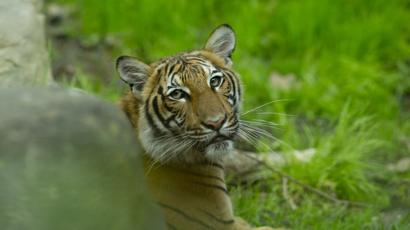
Tiger at US zoo tests positive for coronavirus
A four-year-old female Malayan tiger at the Bronx Zoo has tested positive for the coronavirus.
The Bronx Zoo, in New York City, says the test result was confirmed by the National Veterinary Services Laboratory in Iowa.
Nadia, her sister Azul, as well as two Amur tigers and three African lions, had developed a dry cough and all are expected to fully recover, it says.
The cats are believed to have been infected by a zoo keeper.
"We tested the cat [Nadia] out of an abundance of caution and will ensure any knowledge we gain about Covid-19 will contribute to the world's continuing understanding of this novel coronavirus," the zoo said in a statement on Sunday.
The big cats did have some decrease in appetite but "are otherwise doing well under veterinary care and are bright, alert, and interactive with their keepers".
The zoo said it is not known how the virus will develop in animals like tigers and lions since various species can react differently to new infections, but all the animals will be closely monitored.
None of the zoo's other big cats - four other tigers, snow leopards, cheetahs, a clouded leopard, an Amur leopard, a puma and a serval - are showing any signs of illness.
"Our cats were infected by a person caring for them who was asymptomatically infected with the virus or before that person developed symptoms," said the zoo.
All the tigers showing symptoms were housed in the zoo's Tiger Mountain area.
All four zoos run by the Wildlife Conservation Society in New York City, including the Bronx Zoo, have been closed to the public since 16 March. New measures will now be put in place to protect the animals and their caretakers at all the facilities.
There is "no evidence that any person has been infected with Covid-19 in the US by animals, including by pet dogs or cats," the zoo statement noted.
Conservation experts have warned that the virus could pose a threat to some wildlife like the great apes - and have said measures are needed to reduce the risk of wild gorillas, chimps and orangutans.
Credit: The BBC
